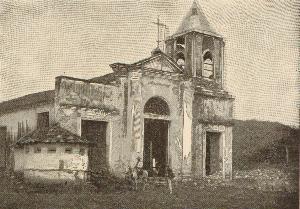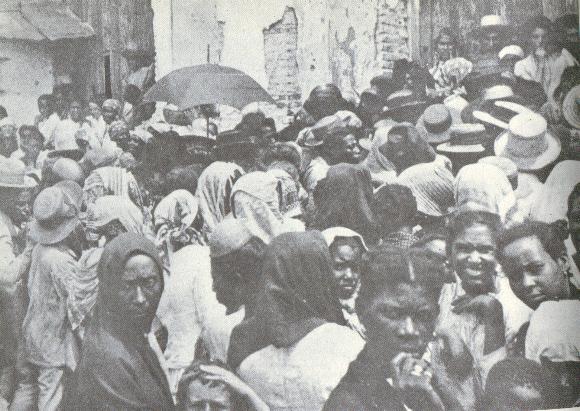
The 34th Michigan arrived at Siboney, Cuba, on July 1, 1898, the day of the assault on the San Juan Heights. The men were running low on paper and envelopes. Most of the letters sent home were sent in reused, dirty and greasy envelopes, which were sewn shut.
[Letter from Private Martin Hoban, 34th Michigan, dated July 14, 1898]
"... After the mail was received, the whole camp was in the best of spirits. The first sight we saw on landing was the 33rd Michigan burying two of their comrades. That night we started for the battle ground. We marched all night and stopped for breakfast about six miles from the abttle ground. It was daylight then and already the guns were booming all along the line. After a march of about two miles further the shells began to break over our heads. At first there was all kids of dodging. Then the bullets began to drop around us. It was then that a couple of the fellows that used to be big braves dropped out or becasme suddenly sick but there were only three or four. Then we got orders to sling our packs and we all fired our stuff and prepared to gp into battle. We were marched around into a gully and prepared to go into the pits, but when we got into that gyully, holy smoke, it was hot! Four men dropped wounded the first thing. Lieut. Col. bennett was hit in the middle button of the coat by a glancing ball, but luckily was not hurt. By this time we were all under cover. We laid in the gully two hours and the bullets were getting thicker and thicker all the time. The only thing that saved us was that we had Springfield rifles with black powder and the regulars using smokeless powder would not let us go into the pits with them. We were marched back behind a big hill, where we were comparatively safe and allowed to rest. We lay down and slept just as peacefully as if we were at home and the bullets were flying around us to beat the band. That night at 10:30 the Spaniards tried to charge and we were called out and we were the first company in of our line on top of the hill. A good many of the companies in our regiment were enagaged but were not allowed to fire, being held as reserves. It did not last long enough to give us a chance. The firing ceased at 10 o'clock in the morning o the 3rd, the Spaniards putting up a falg of truce in order to bury their dead.. We passed the 4th in peace but without anything to eat until night when we some raw bacon and hardtack as we were too hungry to wiat to build a fire. After this we began long marches which continued our days.[Sergeant B. L. Cogshall also writes on July 14]:
I do not wish we had stayed at home but I am ready to go now at any time. We are stationed in the wilderness where it rains and thunders and lightnings all the time. We are supporting a battery here about a mile and a half from the city [of Santiago]"
"We have moved several times since I wrote last. Now we are up in the mountains near santiago supporting a battery and also guarding the trails which lead out of Santiago to keep the Spaniards in the city. The other day we went over to a city called Caney where the refugees from Santiago went. There were 15,000 people in the city which originally held 500. I was sergeant of the guard the day and night we were there and our guardhouse was a church in the center of the city. The company was camped about a mile outside. We had five Spanish prisoners.

The church at El Caney
The church was used by the Red Cross society where they feed the people. I saw just such suffering as there is pictured by the newspapers. People with plenty of money could not spend it - nothing to buy. I helped the Red Cross people feed the refugees and I tell you it was an awful sight, women and children starving and have to send them away. In the evening I saw a woman with a baby four days old lying upon a doorstep dying from hunger. I fixed up some hardtack and hot water and fed her and gave the some coffee for her. We moved the next morning at daybreak so I did not see her again."

Refugees wait outside the church at El Caney for food
Cambridge Daily Press Publishing Company, Tuesday, April 26,
1898, Vol. 1
No. 2
Freidel, Frank, The Splendid Little War, Boston: Little, Brown
and Company, 1958. (refugee image)

